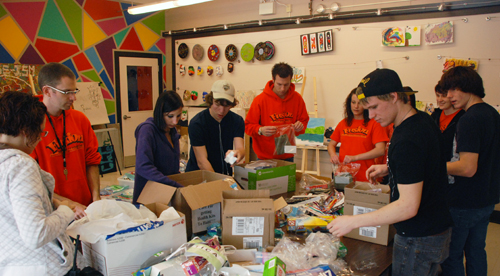
Call it a “fusion” of minds looking to help improve prospects for youth in rural Ontario.
Researchers from two U of G colleges studying the benefits of a youth drop-in centre in Ingersoll have helped the facility refine its programs intended to provide life and career skills for young people in this southwestern Ontario town of 12,000 people.
Referring to a slate of studies — past and ongoing — by Guelph faculty and students, Jason Smith, manager of the Fusion Youth Activity and Technology Centre in Ingersoll, says, “It’s been invaluable for the centre to understand the impact we’re having. It’s really helped us to grow and mature as an organization and build internal capacity.”
Opened in 2006, Fusion provides business and life skills training and recreational activities for teens on a drop-in basis. About 100 young people visit each evening to work with some 18 staff members at the centre.
Under its youth entrepreneurship program, the centre trains teens in computer services, catering, digital recording and multimedia. Youngsters then provide those products and services to external clients under the supervision of industry professionals.
Those teens also take part in a range of recreational programs at Fusion, including arts and culture, leadership, nutrition, fitness and sports, and technology.
Along with Community Employment Services, the centre also runs an employment program for people aged 15 to 29, particularly those who have had problems finding or keeping jobs.
Researchers in the Ontario Agricultural College and the College of Business and Economics have studied the centre and its programs for the past three years.
Those studies have looked at the community impact of the centre as well as aspects of personal development, health and wellness, and skills development, says Smith. “They’ve helped us demonstrate the collective impact and outcomes of our programs and services.”
The research partnership with U of G began after Prof. Al Lauzon, School of Environmental Design and Rural Development, contacted the centre. Teaching and studying in the school’s capacity development and extension program, he saw the centre as a potential research laboratory for himself and his students.
Lauzon had lived in Ingersoll since 1992; he has since moved to Woodstock, Ont.
Among their topics, they have looked at impacts of the after-school programs on area youth. One recent study showed that youth crime rates in the municipality have dropped since the centre was established. Referring to estimated cost savings for Ingersoll’s judicial system, Lauzon says, “There’s a significant cost aversion there.”
That research involved Prof. Fred Pries, Department of Business. In another study, Pries looked at costs of Fusion services and funding sources, including sources besides the municipality. Says Smith, “Because the centre is here, we’ve been able to pull additional dollars and resources to the community.”
Lynne Mitchell studied Fusion during her graduate work with Lauzon. She completed her degree last year as a mature student.
Mitchell, director and international liaison officer in Guelph’s Centre for International Programs, says, “I did PhD research there with youth, looking at how teenagers envision their future, not only what they’re going to be when they grow up, but we also talked about what do they think their roles in the community will be.”
She says her study might help Fusion better assess and understand what its “clients” want from the centre. The centre might stress not just job and career skills but the need for youths to consider the potential benefits of community service.
“That’s something we don’t often get kids to envision,” says Mitchell. “Will you volunteer, coach, vote, be a good neighbour? What kind of citizen are you going to be? Too often the emphasis is on: What kind of worker will you be?
“I wanted to look at asking youth about how they see themselves being in the community 10 years in the future.”
In current studies, Guelph faculty and students are looking at Fusion’s development, its partnerships with businesses and other organizations, social innovation and social enterprises.
Lauzon plans to look at the socioeconomic status of the centre’s patrons to better understand who uses the facility and why.
Run by the municipality, Fusion opened after a strategic planning exercise identified a need to focus on activities for young people in the community.